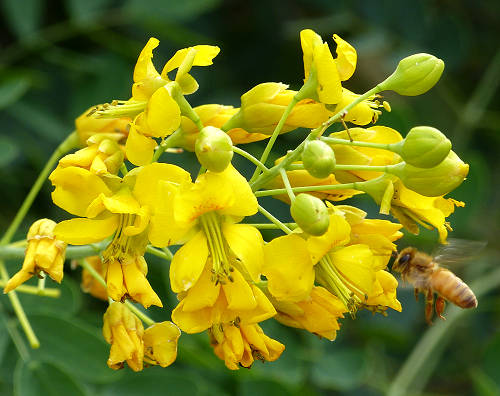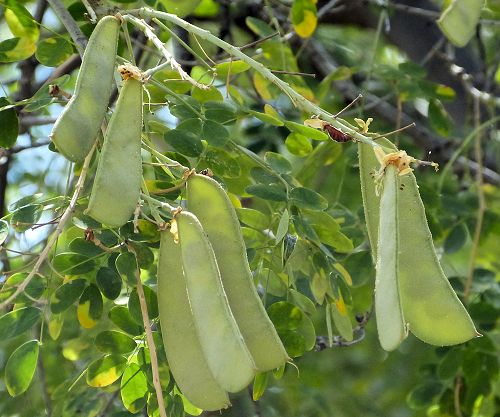Growing Erythrostemon mexicanus:
Mexican Bird of Paradise
Description
Form: A large, multi-stemmed shrub that can be pruned into a tree.
Leaf retention: Evergreen but frost-deciduous.
Growth rate: Rapid.
Mature Size: 10-15' (3-4.5m) high and wide where winter temperatures allow.
Flowers: Bright yellow, slightly fragrant, clustered in spikes on branch tips.
Bloom: Spring, summer, possibly into fall, depending on local microclimate.
Fruit: A tan seed pod that opens explosively to eject bean-like seeds.
Leaves: Dark green, oval leaflets.
Stems: Very brittle. No thorns.
Roots: A nitrogen-fixing legume*.
Wildlife: The flowers attract insects.
Toxic / Danger: The seeds are poisonous.
Origin: Texas and Mexico.
Form: A large, multi-stemmed shrub that can be pruned into a tree.
Leaf retention: Evergreen but frost-deciduous.
Growth rate: Rapid.
Mature Size: 10-15' (3-4.5m) high and wide where winter temperatures allow.
Flowers: Bright yellow, slightly fragrant, clustered in spikes on branch tips.
Bloom: Spring, summer, possibly into fall, depending on local microclimate.
Fruit: A tan seed pod that opens explosively to eject bean-like seeds.
Leaves: Dark green, oval leaflets.
Stems: Very brittle. No thorns.
Roots: A nitrogen-fixing legume*.
Wildlife: The flowers attract insects.
Toxic / Danger: The seeds are poisonous.
Origin: Texas and Mexico.
Cultivation and Uses
USDA hardiness zones: 9-11. This plant may resprout from its roots if frozen.
Heat tolerant: Yes.
Drought tolerant: Yes.
Sun: Best in full sun.
Soil: Well draining, pH 5.6-7.8 (acidic to slightly alkaline). *Do not use a nitrogen fertilizer.
Water once established: Once a month. More often improves flowering.
Mulch: Cover root area with organic mulch before freezing temperatures are expected. Remove mulch after the last frost.
Prune: Remove winter damage after the last frost. To reduce the size of this plant, cut it nearly to the ground after the last frost in mid to late winter, then selectively prune new growth in the spring. The rapid growth of this plant requires frequent pruning or it becomes undesirably large and clumsy in appearance.
Litter: Moderate to high: seed pods, leaves in freezing weather.
Propagation: Seed.
Uses: Ornamental.
USDA hardiness zones: 9-11. This plant may resprout from its roots if frozen.
Heat tolerant: Yes.
Drought tolerant: Yes.
Sun: Best in full sun.
Soil: Well draining, pH 5.6-7.8 (acidic to slightly alkaline). *Do not use a nitrogen fertilizer.
Water once established: Once a month. More often improves flowering.
Mulch: Cover root area with organic mulch before freezing temperatures are expected. Remove mulch after the last frost.
Prune: Remove winter damage after the last frost. To reduce the size of this plant, cut it nearly to the ground after the last frost in mid to late winter, then selectively prune new growth in the spring. The rapid growth of this plant requires frequent pruning or it becomes undesirably large and clumsy in appearance.
Litter: Moderate to high: seed pods, leaves in freezing weather.
Propagation: Seed.
Uses: Ornamental.
Comments
This plant is a member of the Legume family (Fabaceae). Its scientific synonym is Caesalpinia mexicana. It is not related to the Bird of Paradise genus Strelitzia of South Africa. Another common name is Mexican Holdback.
Because the rapid growth of this plant can make it time consuming to manage as well as unsightly, other plants should be considered first.
Do you have additional information or a different experience for these plants that you would like to share? Email info@GardenOracle.com. All contributions are welcome and appreciated.
This plant is a member of the Legume family (Fabaceae). Its scientific synonym is Caesalpinia mexicana. It is not related to the Bird of Paradise genus Strelitzia of South Africa. Another common name is Mexican Holdback.
Because the rapid growth of this plant can make it time consuming to manage as well as unsightly, other plants should be considered first.
Do you have additional information or a different experience for these plants that you would like to share? Email info@GardenOracle.com. All contributions are welcome and appreciated.



Latest update: July, 2024
© 2008-2026 by GardenOracle.com

